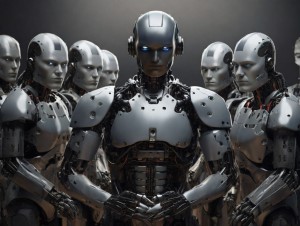In a study published in the prestigious journal, *Nature Machine Intelligence*, a consortium of computer experts from Loughborough University, Yale University, and the Massachusetts Institute of Technology (MIT) has unveiled a visionary concept – Collective AI. Echoing the hive-mind structure of the Borg from Star Trek, Collective AI envisions a network where multiple AI units collaborate and share information seamlessly.
Unlocking collective intelligence new era in AI
Dr. Andrea Soltoggio, lead researcher from Loughborough University, elucidated the concept, likening it to the collective consciousness portrayed in popular science fiction. In this paradigm, individual AI units, akin to the Borg drones, continuously learn and enhance their capabilities. Crucially, when one unit acquires new knowledge, it instantaneously disseminates it across the network, fostering resilience and adaptability akin to the human immune system.
By harnessing the power of collective intelligence, AI units are not confined to isolated silos of information. Instead, they function as interconnected nodes within a dynamic network, enabling rapid knowledge exchange and collaborative problem-solving.
This collaborative framework not only enhances the efficiency of AI systems but also augments their capacity to address complex challenges across various domains.
Collective AI’s impact and safeguards
The implications of Collective AI span a multitude of domains, promising transformative advancements. In cybersecurity, for instance, rapid information sharing among AI units could fortify defense mechanisms against emerging threats.
Similarly, in disaster response scenarios, adaptable robots leveraging Collective AI could swiftly adjust to dynamic environments, enhancing effectiveness. Moreover, personalized medical agents empowered by this technology could revolutionize healthcare delivery by amalgamating cutting-edge medical insights with patient-specific data, thereby improving treatment outcomes.
While acknowledging potential risks associated with Collective AI, such as the dissemination of unethical or illicit information, researchers propose safeguards. By maintaining individual objectives and autonomy within the collective, AI units can mitigate the risk of centralized control, ensuring a democratic distribution of power.
Dr. Soltoggio envisions a future where diverse AI agents coexist harmoniously within a democratic framework, reducing the likelihood of domination by a few large systems. By fostering collaboration and cooperation among AI units while respecting individual autonomy, Collective AI not only maximizes its transformative potential but also ensures ethical and responsible AI development.
By leveraging the collective intelligence of AI systems while implementing robust safeguards, we can harness the full potential of AI technology to address complex challenges and drive positive societal change.
Collective AI redefines the Artificial Intelligence landscape
The concept of Collective AI represents a departure from conventional AI models, such as ChatGPT, which exhibit limited lifelong learning and knowledge-sharing capabilities. Unlike these monolithic systems, Collective AI fosters sustainable evolution and information exchange among interconnected units.
Dr. Soltoggio predicts a paradigm shift, where the dominance of large, non-shareable AI models gives way to a more collaborative and adaptable ecosystem.
the emergence of Collective AI heralds a new era in artificial intelligence, characterized by collaborative learning and decentralized decision-making. Drawing inspiration from science fiction while rooted in cutting-edge research, this concept promises to revolutionize diverse fields, from cybersecurity to healthcare.
With prudent governance and a commitment to democratic principles, Collective AI could unlock unparalleled advancements while safeguarding against potential risks. As humanity ventures into this uncharted territory, the transformative potential of Collective AI remains boundless.
The research leading to these findings was generously supported by the US Defense Advanced Research Projects Agency (DARPA), underscoring the significance of this endeavor in shaping the future of technology and society. While the transformative potential of Collective AI is vast, researchers are keenly aware of the associated risks, particularly regarding the dissemination of unethical or illicit information.





